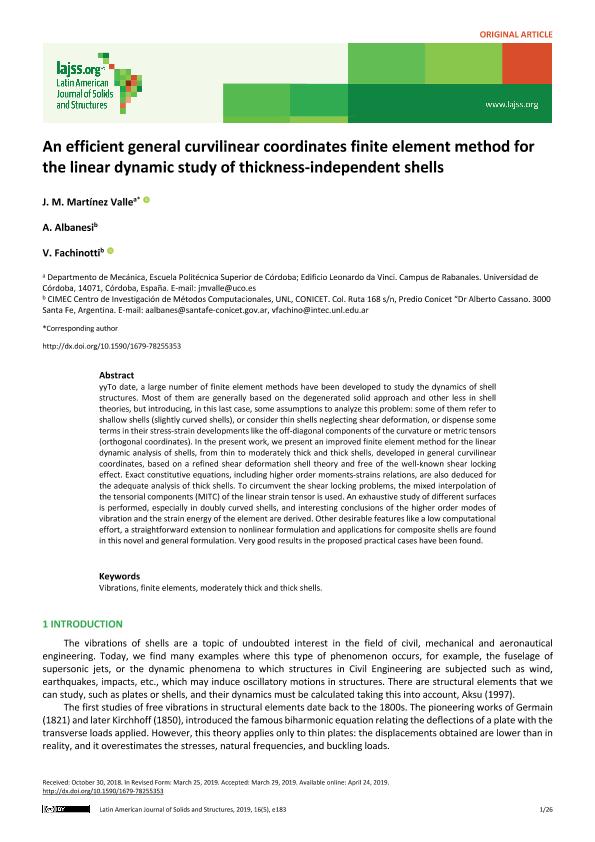Artículo
An efficient general curvilinear coordinates finite element method for the linear dynamic study of thickness-independent shells
Fecha de publicación:
04/2019
Editorial:
Latin Amer J Solids Structures
Revista:
Latin American Journal of Solids and Structures
ISSN:
1679-7817
Idioma:
Inglés
Tipo de recurso:
Artículo publicado
Clasificación temática:
Resumen
To date, a large number of finite element methods have been developed to study the dynamics of shell structures. Most of them are generally based on the degenerated solid approach and other less in shell theories, but introducing, in this last case, some assumptions to analyze this problem: some of them refer to shallow shells (slightly curved shells), or consider thin shells neglecting shear deformation, or dispense some terms in their stress-strain developments like the off-diagonal components of the curvature or metric tensors (orthogonal coordinates). In the present work, we present an improved finite element method for the linear dynamic analysis of shells, from thin to moderately thick and thick shells, developed in general curvilinear coordinates, based on a refined shear deformation shell theory and free of the well-known shear locking effect. Exact constitutive equations, including higher order moments-strains relations, are also deduced for the adequate analysis of thick shells. To circumvent the shear locking problems, the mixed interpolation of the tensorial components (MITC) of the linear strain tensor is used. An exhaustive study of different surfaces is performed, especially in doubly curved shells, and interesting conclusions of the higher order modes of vibration and the strain energy of the element are derived. Other desirable features like a low computational effort, a straightforward extension to nonlinear formulation and applications for composite shells are found in this novel and general formulation. Very good results in the proposed practical cases have been found.
Palabras clave:
VIBRATIONS
,
FINITE ELEMENTS
,
MODERATELY THICK AND THICK SHELLS
Archivos asociados
Licencia
Identificadores
Colecciones
Articulos(CIMEC)
Articulos de CENTRO DE INVESTIGACION DE METODOS COMPUTACIONALES
Articulos de CENTRO DE INVESTIGACION DE METODOS COMPUTACIONALES
Citación
Martínez Valle, J. M.; Albanesi, Alejandro Eduardo; Fachinotti, Victor Daniel; An efficient general curvilinear coordinates finite element method for the linear dynamic study of thickness-independent shells; Latin Amer J Solids Structures; Latin American Journal of Solids and Structures; 16; 5; 4-2019; 1-26
Compartir
Altmétricas




